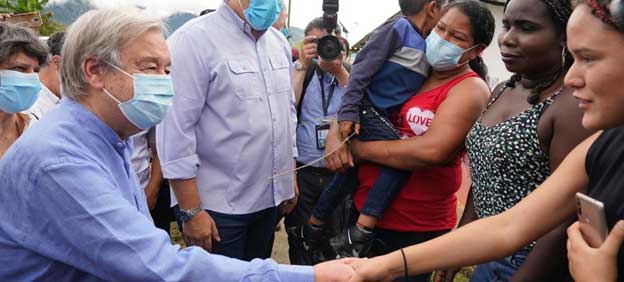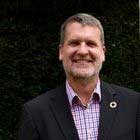Armed Conflicts, Civil Society, Development & Aid, Featured, Headlines, Human Rights, Latin America & the Caribbean, Regional Categories, TerraViva United Nations

Secretary-General António Guterres talks to villagers in Llano Grande, Colombia, where he witnessed how the peace process was developing in Colombia. November 2021. Credit: UNMVC
– On Sunday, 19 June 2022, the hopes of millions of Colombians working for a more democratic, safer, ecological, and socially just country came true.
Senator Gustavo Petro, in a duo with his Afro-Colombian vice-presidential candidate, environmental expert Francia Márquez, received approximately 50.44 per cent or 11,281,013 of the votes cast, and has been elected the 42nd President of Colombia.
Both his predecessor Iván Duque and his opponent Rodolfo Hernández publicly congratulated him on his election victory.
Some 22,445,873 people or 57.55 per cent exercised their right to vote in the run-off election on 19 June 2022, about 3.7 per cent more than in the first round three weeks ago. Only in 1998 was the turnout higher.
Getting people to the polls is not always easy in Colombia: Thousands of people in some parts of the country again had to travel for several hours, even days, to reach one of the polling stations. In some regions, heavy rain also prevented people from voting. In addition, threats, violence, and vote-buying continue to restrict voting, especially in remote rural areas.

Oliver Dalichau
For the first time in the country’s history, neither a conservative nor a member of the Liberal Party will lead the government of Latin America’s fifth largest economy.
With Gustavo Petro, the winning streak of leftist movements and parties in Latin America continues and provides further momentum for the upcoming elections in Brazil in October 2022.
Gustavo Petro’s opponents
In this historic situation for Colombia, what will matter is how the losers behave. On Sunday, Petro not only relegated his direct challenger, the anti-women and anti-migrant 77-year-old self-made millionaire and populist, Rodolfo Hernández, to second place, but with him also the country’s previous political elite.
With 47.31 per cent or 10,580,412 votes, Hernández received much less support than the polls had predicted.
However, significantly more people than in the last elections opted for neither candidate: 490,118 or 2.23 per cent gave a voto blanco.
This is a Colombian peculiarity that allows voters to express their disagreement with the candidates but, unlike abstention, allows them to exercise their democratic right.
Precisely because this triumph is so unique, President Petro should now reach out to his critics, remind the losers of their responsibility in state politics and call on the opposition to work constructively. At the moment, it is unclear whether the losers will be able to accept their new role.
The military, traditionally strong in Colombia, also remains a key player in this phase of the democratic transition. It is expected that the military leadership will soon send out signals that leave no doubt about Gustavo Petro’s election victory.
He will also be their commander-in-chief after his inauguration on 7 August. Should the recognition fail to materialise publicly, Petro’s presidency would be tainted from the outset and rumours of an imminent coup d’état would continue to do the rounds. Both Colombian NGOs and the international community should keep a close eye on this.
Six urgent challenges
In any case, the new president faces enormous challenges. It is already questionable whether Petro will find a majority in the Colombian parliament for a fundamental change of the unequal living conditions, the high unemployment, inflation rate, national debt, and the necessary socio-ecological transformation of the country.
Although quite a few deputies of his left-progressive alliance Pacto Histórico support Petro after the congressional elections in March, he lacks a legislative majority of his own.
Moreover, the newly elected representatives must first prove that they can stick together and also lead a government together, especially now that the ministers are to be appointed. Tensions are already pre-programmed in the colourful spectrum of the Pacto Histórico.
The government’s most urgent tasks include:
Reviving the peace process: In the last four years under Iván Duque’s ultra-right government, the peace process signed in 2016 with the former guerrilla group FARC was hardly implemented.
President Petro needs to relaunch it, push for its implementation, and ensure that social and local leaders are better protected from displacement, violence, and assassination. This year alone, more than 60 of these líderes sociales have been murdered.
After this process, a dialogue with the guerrilla organisation ELN would be necessary too. It is up to the new government to send out signals define conditions as to whether and how negotiations can take place.
A new economic policy: Petro takes over a country with the highest inflation rate of the last 21 years from his unpopular predecessor. With a current debt of around 63 per cent of gross domestic product (GDP) and a budget deficit of over six per cent, the president-elect has announced that he will begin his term with a structural tax reform.
This envisages an increase in the tax burden for the richest 0.01 per cent of the population. This idea is vehemently opposed by the political right. During the election campaign, they left no stone unturned to discredit Petro, accusing him of preparing the country’s economic decline.
Commitment to women’s rights and greater equality: Petro proposes the creation of a Ministry of Equality led by Francia Márquez, which would be responsible for formulating all policies to empower women, people of all sexual orientations, the different generations, and ethnic and regional diversity in Colombia.
Under Petro, women in particular could expect to gain priority access to public higher education, credit, and the distribution and formalisation of land ownership.
Petro and Marquez are proposing an energy transition that will rule out new developments of future oil fields.
Land reform and protection of indigenous people, peasants, and Afro-Colombian women: The extremely unequal distribution of land is one of the structural causes of the armed conflict in Colombia. The internal displacement of recent decades has led to the expansion of arable land: the resulting tensions are at the root of conflicts between ethnic communities (indigenous and Afro-Colombian) and peasant women over access to this land.
All these groups have been and continue to be excluded from the development of the country. At the same time, they are among the most affected by the armed conflict’s violent dynamics.
Petro’s government will need to ensure a more equitable distribution that enables the integration of ethnic and farming communities into the production and development circuits.
Better education for more people: During the social protests last year (and already in 2019 and 2020), the demand for more public and quality education was one of the central messages of the mostly peacefully demonstrating Colombians.
Petro promises to provide them with a higher education system in which public universities and secondary schools in particular are properly funded.
More environmental protection: Under the Duque government, environmental and climate protection in Colombia was largely neglected, deforestation increased, and the first fracking pilot wells were approved. Petro and Marquez have announced fundamental change.
They are focusing on a more environmentally-friendly production and service model and are proposing an energy transition that will rule out new developments of future oil fields. This process is to be accompanied by a land reform on unproductive lands – mostly resulting from illegal forest clearance.
A Colombia of social justice
Beyond these urgent reform tasks, the president and his government will also have to find answers in other important areas, such as integrated security reform, a diversified new foreign policy, a different drug policy, and on the regulation of narcotics.
At the same time, they must not disregard the necessary coalition with civil society that ultimately lifted them into office.
Gustavo Petro and Francia Márquez achieved something historic on that memorable Sunday in June 2022. The expectations for both are huge, perhaps even unrealistic. On the one hand, the winning couple must stick together and remain capable of compromise.
At the same time, both have raised many hopes and are exemplary for the new Colombia: both want a more social, a more ecological, a more secure, and a more democratic republic.
President Petro will make mistakes and he will hardly be granted the usual 100 days grace period.
The fact that the ultra-conservative and liberal power elites were voted out of office by the majority of Colombians is a political turning point for the country. The losers will hardly accept the new opposition role constructively – and as an important element of a consolidated democracy.
It is more likely that they will torpedo the new government from day one and do everything they can to make it fail.
President Petro will make mistakes and he will hardly be granted the usual 100 days grace period – neither by his hopeful supporters from civil society, nor by the more than ten million people he has failed to convince of his programme and person.
He will have to govern openly, transparently, and with a certain flexibility to be able to react appropriately to national and international challenges. He will have to change his behaviour, which is often described as arrogant and self-centred.
And he should emphasise the social team spirit that was the basis for the victory of the Pacto Histórico. That is the only way he can succeed in breathing new life into the peace process and achieve the urgently needed reforms in economic and social policy for Colombia. And he will need many allies to succeed, both at home and abroad.
German and European politicians would be well advised to pledge their support to the new president and strengthen the peace process along the way. At the same time, this would contribute to the consolidation of democratic institutions after this historic change of government.
Both remain crucial for a sustainable, peaceful development of the country, and necessary for a Colombia of social justice.
Oliver Dalichau heads the office of the Friedrich-Ebert-Stiftung in Colombia.
Source: International Politics and Society (IPS)-Journal published by the International Political Analysis Unit of the Friedrich-Ebert-Stiftung, Hiroshimastrasse 28, D-10785 Berlin
IPS UN Bureau
